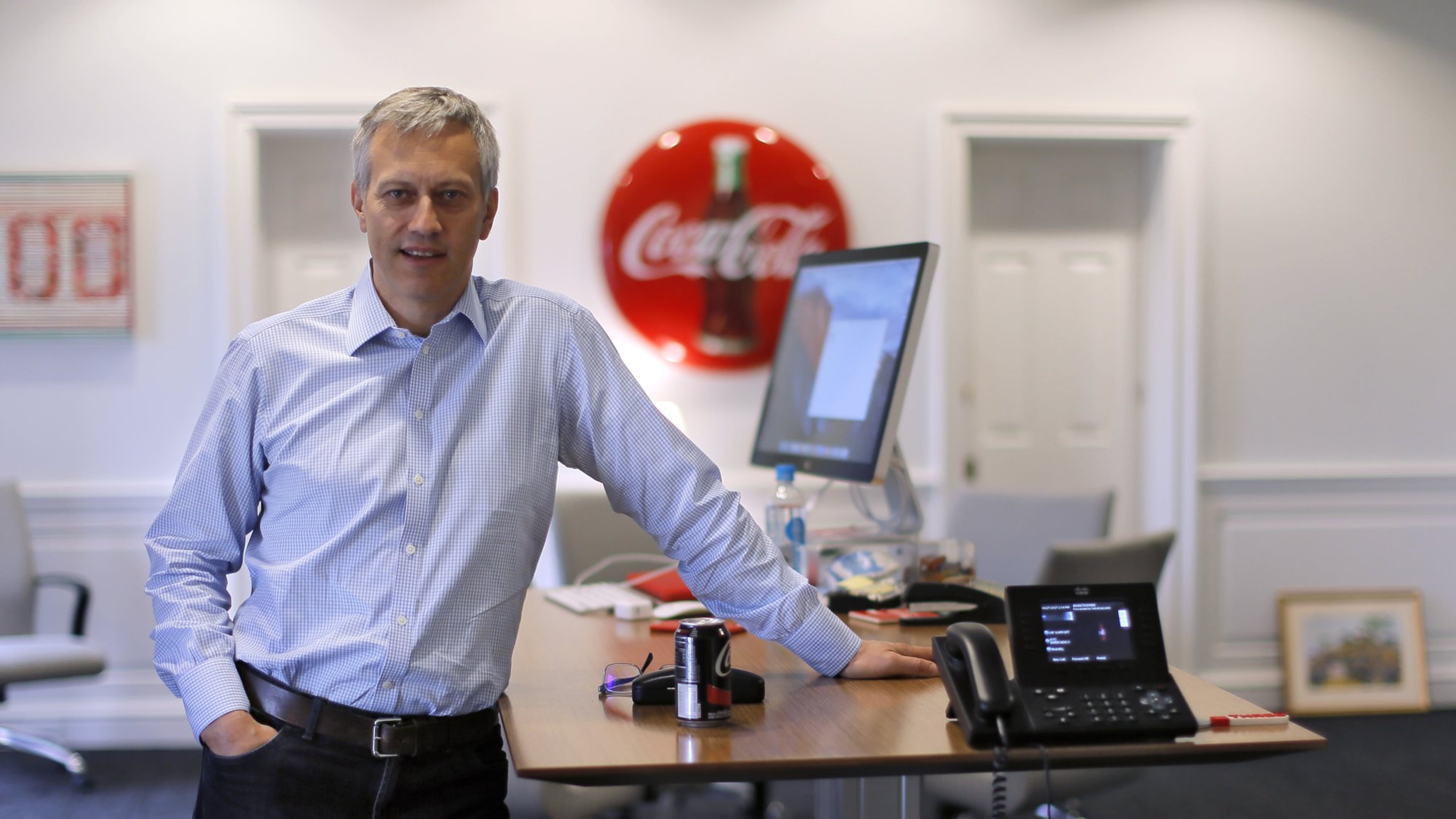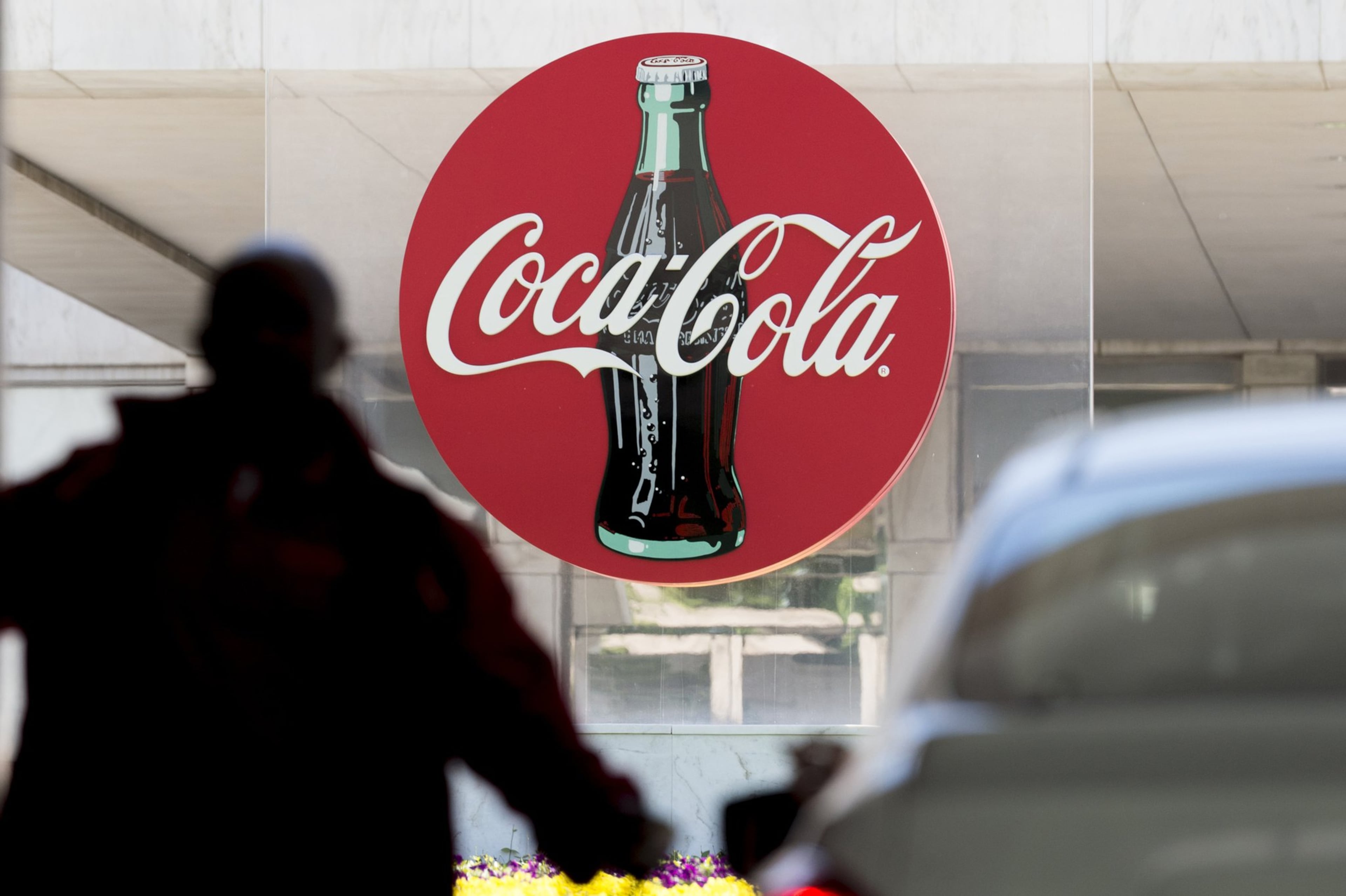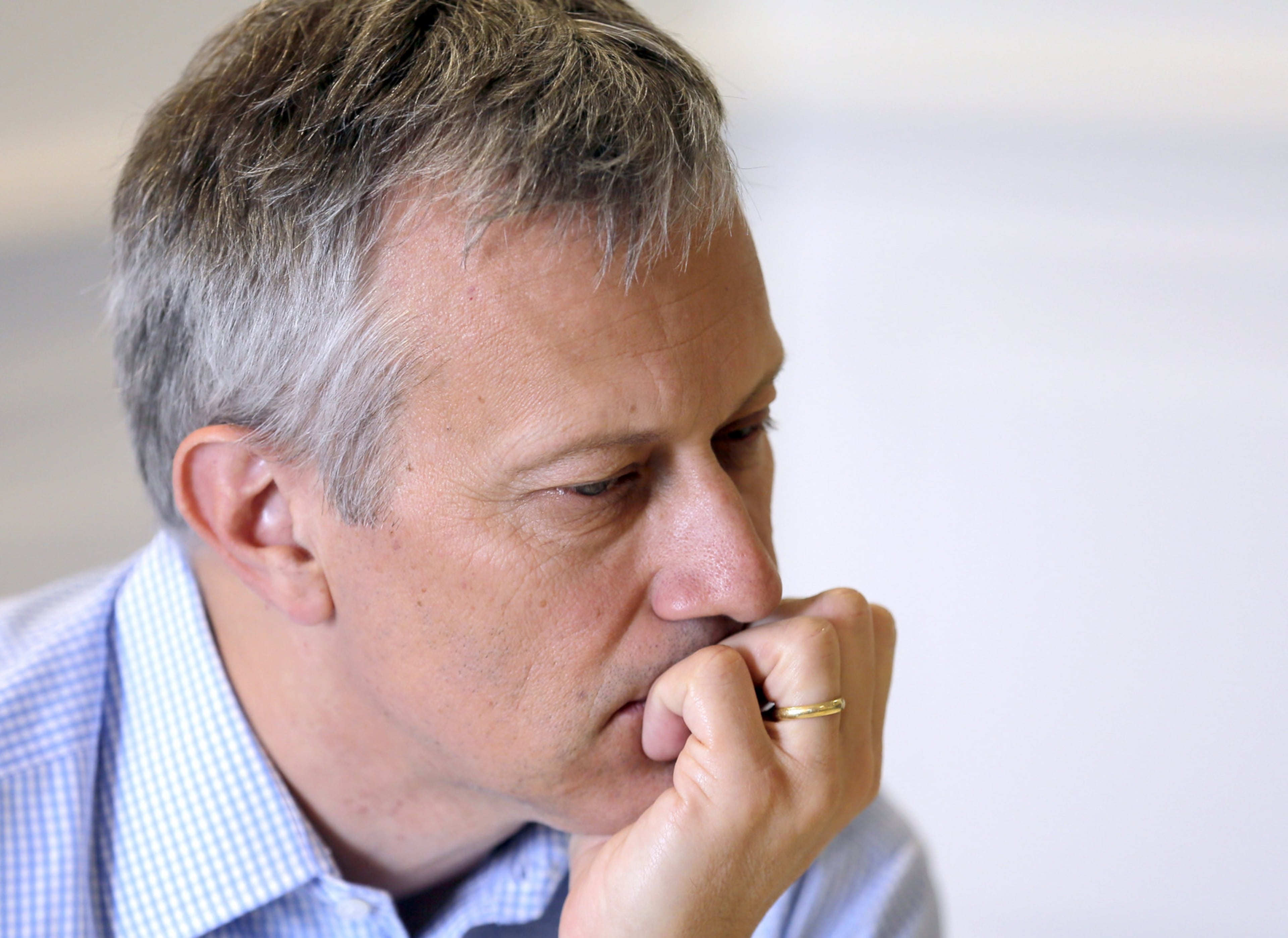Coke’s new CEO: ‘The next stage has to be about growth’

James Quincey, 52, began his tenure as Coca-Cola's new chief executive with a bang, recently announcing that the soft drink company will need to cut about 1,200 jobs, mostly at its Atlanta headquarters.
The 20-plus-year Coke veteran, who hails from Britain, says the job cuts are needed to free up about $800 million in annual spending. That money, he says, will partly be used to help rejuvenate Coca-Cola’s growth, which has flagged in recent years as folks switched to less fattening drinks or simply skipped traditional sodas for something different.
Quincey's plan is to make sure Coca-Cola has profitable drinks to put in everyone's hands, whatever their tastes.
A few days before Quincey formally became CEO on May 1, The Atlanta Journal-Constitution spoke with him in his office about the challenges and his plans for juicing Coke's growth. Some of his comments appeared in a recent AJC story on the leadership change. This Q&A offers a deeper look at his thinking.
Quincey’s comments have been edited for length and clarity.
Q: Would you view yourself as a turnaround CEO? What kind of CEO are you?
A: Well, we're about to find out … What I've always been about is the next stage of growth. In a way, it doesn't matter so much whether you were a successful business or a business that had problems. Both of them need the next stage of growth. And there are very few businesses whose trajectory is totally unchanged decade after decade.
I … see it more as you want to bring in someone who can generate the next stage of growth. I think that’s what Coke’s about. We spent the last X number of years reforming the foundation… And the next stage has to be about growth.
That’s how I see myself. It’s always about, ‘We are where we are. That was good. That was bad. But we are where we are. What do we we need to do for the next stage of growth?’ That’s where we need to focus. The past is about learning, not lamenting.
Q: Is (Coke) a turnaround situation?
A: I don't know that I would say turnaround, but for sure we slowed down. We had 130 years of a fabulous record and we had a golden era in the 1980s and 1990s as we expanded to every country around the world. But that's a one-off kind of opportunity.
We were doing pretty well in the beginning of this century, and even post-(financial) crisis. But then we kind of hit a wall, partly through things we should have done, and partly things out of our control, like the dollar getting stronger. We make the vast majority of our money overseas. When the dollar gets stronger it has a mechanical impact on our earnings (because foreign profits are smaller when converted to dollars).
The last few years, (that has caused) about an 8 or 9 percent reduction in earnings. When you start the year you’re already in the hole.

Things we didn’t control — we weren’t investing the right amount of money behind some of our core brands in sparkling (Coke’s term for sodas, as opposed to ‘still,’ or non-carbonated, drinks).
And so we had to find the money to generate the re-investment. (We had to) refocus the business on a revenue orientation around our sparkling brands and less (on) volume for the sake of volume.
And we knew that we wanted a stronger business system of bottling partners for the future. We brought into the hospital ward, if you like, a number of bottlers. (They are now being sold in a process Coke calls refranchising.)
Having (gone) most of our way through that process, we can see that our new partners are stronger and the sales are the same or better.
So now, I think that’s when we look and say, ‘The next stage of growth, what is it?’
It comes down to everyone is going to drink eight 8-ounce drinks a day, and they’re not going to be the same (as in the past). So now that we’ve stabilized sparkling, we can continue to grow some … other categories so that we truly have a broad portfolio. We’re kind of halfway across the river.
And yes, we’d like to see the revenue growth rates pick up from where they are right now… I don’t think we’re broken, but I don’t think we’re where we need to be.
Q: How long will it be before we again see rising revenue and profits at Coke?
A: Revenue, what we report in the financial report, that's going to be 2019. Why? Because we're selling businesses. You don't have to sell many (bottling) businesses for your revenue to come down. Until that's done, you can't grow. The final sales will probably be by the end of this year.
In 2018, even if we have a fantastic year, we’ll still be comparing to (2017) when we still had all these businesses.
If you ignore (the effect of) all the businesses you’re selling, then I think you’re already seeing … solid growth. But let’s be honest. It’s confusing the hell out of everyone. The investment analysts and everyone is trying to understand that question.
Profits (haven’t) … gone up the last three years. We’re not satisfied with that. We’re unhappy.
Will it go up in 2017? To be seen. Our guidance (to investors) says we’re not going to get there. But I think our view is 2018, and 2019, it will go up.
Q: I’ve heard you’re a laid-back kind of guy. Back packs and blue jeans at work. But the first thing you’ve done as CEO, basically, is cut 1,200 jobs. What does that say about you?
A: First, I wouldn't say it's the first thing… In December when we made the (succession) announcement I was already saying to the board 'Here is where we need to go with the next step of the strategy.' We laid that out at (an industry analysts' meeting) in February. We said 'This is where the vision is. Here's where we want to go. And yes, it will have some changes to the organization.'
And I personally committed to (Coke employees) everything that was going to happen they were going to hear from me, and they were going to hear it first (as long as it didn’t violate securities law). Because anything you do with jobs needs to be done the right way.
The simple reality of the job reductions, which are always a painful process, is we are entering a period where we are selling off all these bottling companies. We just have less business to control and run from the center, from Atlanta. We have to incorporate all of the technological changes that are coming towards us that will allow us to do work in a different way. And … we need to be focused on the work we want to do and the work we don’t want to do.
With the junction of those three trends … we reached the conclusion that we could do it with less people.
We’re very clear on the human dimension of this. We’ve committed to due process, fairness, dignity, speed. I underline speed because people don’t want this to linger on. If it’s going to be something painful, let’s get on with it.
Q: How is an employee likely to experience this?
A: We're going to run an assessment process for people so that there's as much objectivity as one can allow … whether it's performance, functional skills, orientation toward the future leadership, so that everyone has the best shot that's fair and reasonable.
Q: Coca-Cola has had an out-sized impact on the city over its history. Given what’s going on with the job cuts, troubles with the core product, etcetera, should Atlanta be worried?
A: I don't think Atlanta should be worried. Firstly, I think Coke has a long, storied tradition of being a supporter, a promoter of Atlanta and the region. The examples are so numerous we don't want to absorb all the time with naming examples. They came through what the employees did, what the leadership did, what the company itself did. They came through the philanthropy of the shareholders of the company. That's been tens and hundreds of millions of dollars, if not billions of dollars, of investment in the region.
We’ve been part of helping Atlanta to be one of the best economies in the U.S… . And I think that’s good for the company, because it’s better to be in a big marketplace than a small marketplace, and it’s great for the city. And we will continue to play a big role.

Q: These job cuts are expected to generate $800 million in savings by 2019, on top of a $3 billion cost-saving campaign Coke announced in 2015. Where are you now on achieving that $3.8 billion total?
A: We've done approximately $1.7 (billion).
Q: And what have you done with that savings?
A: The majority of the past savings through 2016 were really about reinvestment and re-staging behind 'sparkling.' Bear in mind that everything you save, part of that just gets eaten up by inflation. Part of that you reinvest in new capabilities.
The economic history of the world is simple in the sense that it’s about moving resources from one activity to the next activity to grow total wealth of the population. Otherwise 95 percent of us would still be in agriculture.
So most of the money went to inflation, reinvesting in sparkling marketing, and some new capabilities.
Going forward, of the $800 (million,) we said we’d invest about half of that in new (product) categories.
Q: What about the other half?
A: The other half we're going to hold onto and make a decision in 2018.
We want to build the consumer business for the very long term. So we’re interested in the health of our brands, and whether consumers are interested in buying them. We call it incidence. In other words what percentage of the population bought one of our brands in the last four weeks. That’s kind of the long-term brand health.
The second leg of the stool is we task our local operating units to succeed in their local markets, which largely means in their local currencies.
When you’ve got a strengthening currency, the problem becomes the sum of the parts doesn’t generate growth in dollars.
We’re going to add a third objective, because you want the U.S. dollar earnings of the company to go up. If we see the opportunity for faster growth, we can re-invest (the other half of the $800 million). If we see the world economy (is) complicated still, we can just perhaps let some of it become U.S. dollar earnings.
Q: A turnaround expert I interviewed said one of the biggest risks for CEOs at big, mature companies is that they face tremendous pressure to do something — anything — to revive growth. They might pay too much for an acquisition that later turns out to be a big mistake. Do you worry about that?
A: Yeah. The first answer that came to my mind is we've been there and done that. In the '70s we became a kind of a mini-conglomerate and bought all sorts of diversified things because we thought we needed different revenue streams. Columbia Pictures. Sterling Vineyards. Catfish farms in Florida.
It didn’t work out so well. Our glory period came after that when we sold those things off and focused back on the beverage business.
So we’re very clear that getting into any other business, the further you get from the core, the more you’ve got to ask a very, very profound question. Because we’ve gone down that conglomerate route before.
Will there be pressure to do things? I think the pressure to do things is proportionate to the lack of progress on the core. I think (people) are seeing (progress) more clearly now.
Q: You’re saying pretty much everybody will be able to see that your strategy is working by 2019?
A: Those … willing to crunch a few numbers can probably see it now. If you were going to do a bit of light math you can see it in 2018. I'm for sure you'll be able to see it in 2019 just by glancing at the piece of paper (Coke's financial reports.)
MYAJC.COM: REAL JOURNALISM. REAL LOCAL IMPACT.
AJC Business reporter Russell Grantham keeps you updated on the latest news about major companies, CEOs and public utilities in metro Atlanta and beyond. You'll find more on myAJC.com, including these stories:
Never miss a minute of what's happening in local business news. Subscribe to myAJC.com.


